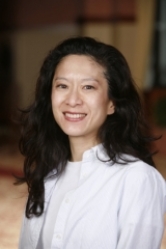
Margaret M. Chou, PhD
Associate Professor of Pathology and Laboratory Medicine
Associate Professor of Cell and Developmental Biology
Perelman School of Medicine at the University of Pennsylvania
Contact InformationChildren's Hospital of Philadelphia
Department of Pathology and Laboratory Medicine
Abramson Pediatric Research Center, Rm. 816E
3615 Civic Center Blvd.
Philadelphia, PA 19104
Tel: 267-426-9228
Fax: 267-426-5165
Email: mmc@pennmedicine.upenn.edu
Research Expertise
Research Interests:
Bone and soft tissue tumors; sarcoma; mechanisms of malignant transformation; ubiquitination; GTPases; NFkB
Description of Research:
My career interest is to understand the mechanisms underlying malignant transformation. The progression of a normal cell into a cancerous one entails profound changes in numerous cellular functions, including its proliferation, survival, and motility/invasiveness, all of which contribute to metastatic behavior. These cell autonomous changes are coupled with alterations in the tumor cells’ microenvironment, which exhibits a mutual regulation with the tumor cells and impacts upon the above properties. My work has been aimed at identifying the signaling pathways that play pivotal roles in these processes.
Most recently, we have focused our efforts on elucidating critical pathogenic factors in the development of bone and soft tissue tumors (BSTTs). In comparison to carcinomas and hematological malignancies, much less is known about the etiology of BSTTs, some of which preferentially affect children. A subset of pediatric BSTTs are driven by pathognomonic chromosomal translocations, including Ewing sarcoma, alveolar rhabdomyosarcoma, and aneurysmal bone cyst. Studies in my laboratory are aimed at identifying the mechanisms by which they contribute in disease pathogenesis. We have recently determined that the TRE17/USP6 oncogene acts as a critical pathogenic agent across a number of BSTTs. TRE17 affects multiple aspects of tumor cell biology and simultaneously modulates the tumor microenvironment. The goals of my laboratory are to determine the molecular mechanisms by which TRE17 functions, to identify additional cellular pathways critical for BSTT pathogenesis, and to develop murine models of BSTTs to ultimately allow development of novel therapeutic strategies.
My laboratory also focuses on pathogenic mechanisms of Ewing sarcoma, alveolar rhabdomyosarcoma, and a newly described cancer, sinonasal sarcoma. Efforts are underway to identify the mechanism by which their respective pathognomonic translocations function in these cancers, and identifying novel sensitivities to cytotoxic agents.
Lab Personnel:
Laura Quick - Research Specialist
Robert Young - Research Specialist
Ian Henrich - Graduate Student
Krista Bledsoe - Postdoctoral Associate
Itmat Expertise
Pediatric neoplasms; sarcoma; Inflammatory signaling; ubiquitination; GTPases
Graduate Groups
Cell and Molecular Biology
Pharmacology
Education
BA (Biochemistry), Barnard College, 1987
PhD (Molecular Oncology), Rockefeller University, 1993
Specialty Certification
Postgraduate Training
Research Assistant, Biochemistry and Cell Biology, Rockefeller University, 1987-89
Postdoctoral Fellow, Department of Cell Biology, Harvard Medical School, 1993-77
Awards and Honors
Research Special Fellow, Leukemia and Lymphoma Society
Memberships and Professional Organizations
AACR, 2013 - Current
NCI Study Section
Special Emphasis Panel: OBT Cancer Biology
Ad hoc Member, 2017 - 2017
Society for Immunotherapy in Cancer, 2017 - current
NCI Study Section
Special Emphasis Panel: Provocative Questions in Pediatric Cancer
Ad Hoc Member, 2018 - 2018
Member of Membrane Biology and Protein Processing (MBPP) Study
Section, NIH, - Present
American Society for Microbiology, - Present
American Society for Cell Biology, - Present
Web Links
Pharmacological Sciences graduate group faculty webpage.
Selected Publications
Natural Killer Cell Activation by Ubiquitin-specific Protease 6 Mediates Tumor Suppression in Ewing Sarcoma
Jain K, Henrich IC, Quick L, Young R, Mondal S, Oliveira AM, Blobel GA, Chou MM. Cancer Res Commun 3(8):1615-1627, Aug 2023. doi: 10.1158/2767-9764.CRC-22-0505. PMID: 37615015; PMCID: PMC10443598.
Morphologically malignant nodular fasciitis with CALD1-USP6 fusion
Papke DJ Jr, Oliveira AM, Chou MM, Fletcher CDM. Virchows Arch 479(5):1007-1012, Nov 2021. doi: 10.1007/s00428-021-03149-8. Epub 2021 Jul 2. PMID: 34213575.
Ubiquitin-Specific Protease 6 Functions as a Tumor Suppressor in Ewing Sarcoma through Immune Activation
Henrich IC, Jain K, Young R, Quick L, Lindsay JM, Park DH, Oliveira AM, Blobel GA, Chou MM. Cancer Res 81(8):2171-2183, Apr 2021. doi: 10.1158/0008-5472.CAN-20-1458. Epub 2021 Feb 8. PMID: 33558334; PMCID: PMC8137534.
USP6 Confers Sensitivity to IFN-Mediated Apoptosis through Modulation of TRAIL Signaling in Ewing Sarcoma
Henrich IC, Young R, Quick L, Oliveira AM, Chou MM. Mol Cancer Res 16(12):1834-1843, Dec 2018. doi: 10.1158/1541-7786.MCR-18-0289. Epub 2018 Aug 21. PMID: 30131449; PMCID: PMC6279478.
Fusion gene profile of biphenotypic sinonasal sarcoma: an analysis of 44 cases
Fritchie KJ, Jin L, Wang X, Graham RP, Torbenson MS, Lewis JE, Rivera M, Garcia JJ, Schembri-Wismayer DJ, Westendorf JJ, Chou MM, Dong J, Oliveira AM. Histopathology 69(6):930-936, Dec 2016. doi: 10.1111/his.13045. Epub 2016 Sep 23. PMID: 27454570.
Jak1-STAT3 Signals Are Essential Effectors of the USP6/TRE17 Oncogene in Tumorigenesis
Quick L, Young R, Henrich IC, Wang X, Asmann YW, Oliveira AM, Chou MM. Cancer Res 76(18):5337-47, Sep 2016. doi: 10.1158/0008-5472.CAN-15-2391. Epub 2016 Jul 20. Erratum in: Cancer Res. 2016 Dec 1;76(23 ):7072. PMID: 27440725; PMCID: PMC5026615.
USP6 oncogene promotes Wnt signaling by deubiquitylating Frizzleds
Madan B, Walker MP, Young R, Quick L, Orgel KA, Ryan M, Gupta P, Henrich IC, Ferrer M, Marine S, Roberts BS, Arthur WT, Berndt JD, Oliveira AM, Moon RT, Virshup DM, Chou MM, Major MB. Proc Natl Acad Sci U S A 113(21):E2945-54, May 2016. doi: 10.1073/pnas.1605691113. Epub 2016 May 9. PMID: 27162353; PMCID: PMC4889410.
USP6 genetic rearrangements in cellular fibroma of tendon sheath
Carter JM, Wang X, Dong J, Westendorf J, Chou MM, Oliveira AM. Mod Pathol 29(8):865-9, Aug 2016. doi: 10.1038/modpathol.2016.83. Epub 2016 Apr 29. PMID: 27125357.
PPP6R3-USP6 amplification: Novel oncogenic mechanism in malignant nodular fasciitis
Guo R, Wang X, Chou MM, Asmann Y, Wenger DE, Al-Ibraheemi A, Molavi DW, Aboulafia A, Jin L, Fritchie K, Oliveira JL, Jenkins RB, Westendorf JJ, Dong J, Oliveira AM. Genes Chromosomes Cancer 55(8):640-9, Aug 2016. doi: 10.1002/gcc.22366. Epub 2016 May 30. PMID: 27113271.
TRE17/USP6 regulates ubiquitylation and trafficking of cargo proteins that enter cells by clathrin-independent endocytosis
Funakoshi Y, Chou MM, Kanaho Y, Donaldson JG. J Cell Sci 127(Pt 21):4750-61, Nov 2014. doi: 10.1242/jcs.156786. Epub 2014 Sep 1. PMID: 25179595; PMCID: PMC4215716.


